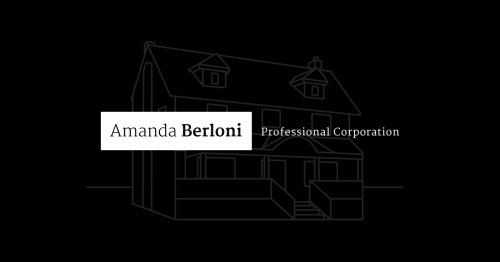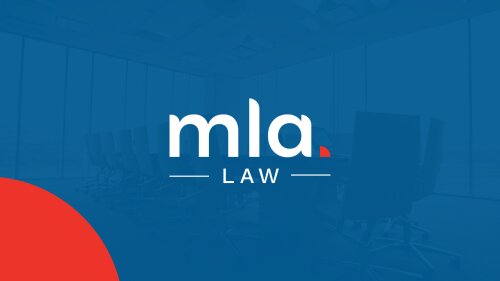Best Foreclosure Lawyers in Greater Sudbury
Share your needs with us, get contacted by law firms.
Free. Takes 2 min.
Free Guide to Hiring a Real Estate Lawyer
List of the best lawyers in Greater Sudbury, Canada
About Foreclosure Law in Greater Sudbury, Canada
Foreclosure is a legal process that lenders use when a homeowner fails to make mortgage payments. In Greater Sudbury, Ontario, the law primarily follows provincial statutes and procedures. Foreclosure allows the lender to take control of the property to recover the outstanding loan balance. Although foreclosure is less common in Ontario compared to "power of sale" proceedings, it can still occur. Typically, the court becomes involved, and the process can be lengthy and complex, because legal ownership of the property transfers entirely from the homeowner to the lender.
Why You May Need a Lawyer
Facing foreclosure can be overwhelming and confusing. Many homeowners in Greater Sudbury may need legal assistance in situations such as:
- Receiving a Notice of Default or other legal documents from a lender
- Disputing the amount owed or believing the lender made an error
- Needing help to negotiate with the lender for alternate payment arrangements
- Protecting your rights during the foreclosure or power of sale process
- Wanting to explore options such as refinancing, loan modifications, or bankruptcy
- Being a landlord or tenant affected by a property in foreclosure
- Having concerns about eviction and relocation timing
- Needing help to interpret complex legal documents and court filings
A lawyer can help explain your rights, negotiate on your behalf, represent you in court, and suggest solutions that may allow you to keep your home or minimize your losses.
Local Laws Overview
Foreclosure in Greater Sudbury is governed by Ontario's legal framework. Here are some key points specific to the region:
- Ontario law favours "power of sale" over foreclosure, but foreclosure is still possible through court action.
- If a lender chooses foreclosure, they must apply to the Ontario Superior Court of Justice, seeking an order to take title to the property.
- Homeowners have the right to "redeem" the property by repaying the debt up to a certain stage in the proceedings.
- If the court grants a foreclosure order, ownership of the property permanently transfers to the lender; the homeowner loses all equity and remaining claim to the property.
- If property values exceed the mortgage amount, power of sale is often used so any surplus after the debt is covered goes to the homeowner.
- Lenders must follow statutory procedures for notices, waiting periods, and court applications.
- Certain consumer protections apply, and details may vary based on the unique facts of the case and the terms of the mortgage.
Frequently Asked Questions
What is the difference between foreclosure and power of sale?
Foreclosure transfers ownership of the property to the lender through court order, ending the homeowner's rights to the property. Power of sale allows the lender to sell the property, pay off the mortgage debt, and return any surplus to the homeowner.
How long does the foreclosure process take in Greater Sudbury?
Foreclosure is a lengthy process in Ontario, often taking several months to over a year, depending on court schedules, documentation, and whether the homeowner disputes the proceedings.
Can I stop foreclosure after it has started?
Yes, in most cases, you can halt foreclosure by repaying the full amount owed (plus costs) before the court grants a final order, or by negotiating a repayment plan with your lender.
Do I have to move out immediately if foreclosure is granted?
No, you generally have some time to vacate the property, but once the court order is final, you must leave as directed. The timeline will depend on court instructions.
What happens to my credit if I go through foreclosure?
Foreclosure will negatively impact your credit score, making it more difficult to obtain loans or credit in the future. The record remains on your credit report for years.
Is it possible to get any money back after a foreclosure?
If the foreclosure converts to a power of sale (which is more common), and the property sells for more than the debt owed, you may receive the surplus. In strict foreclosure, the lender keeps the property and you do not receive any excess value.
I’m a tenant-what are my rights if the property is being foreclosed?
Tenants in Ontario usually have some protections, but effects can vary. Your tenancy may continue under a new owner, or you may receive a notice to vacate, depending on the circumstances and lease terms.
What should I do if I receive a notice from my lender?
Read the notice carefully, note any deadlines, and seek legal advice immediately. Early action may offer more solutions to keep your home or reach a settlement.
Can a lawyer help me keep my home?
A lawyer may help negotiate with your lender, raise legal defences, or propose alternatives such as refinancing, forbearance, or restructuring the debt to avoid foreclosure.
How much does it cost to hire a foreclosure lawyer in Greater Sudbury?
Costs vary based on the complexity of your case, the type of legal services required, and the lawyer’s experience. Many lawyers offer an initial consultation at a reduced rate or for free. It’s important to discuss fees before retaining a lawyer.
Additional Resources
If you are facing foreclosure in Greater Sudbury, several resources can provide information, support, or direct assistance:
- Ontario Ministry of the Attorney General: Information on court processes and legal rights
- Legal Aid Ontario: Offers help for those who qualify financially, including advice and representation
- Suzanne Mills Community Legal Clinic (Sudbury): Local clinics may offer free legal advice or representation in housing matters
- Sudbury District Law Association: Can help you find a qualified lawyer in the area
- Canadian Bar Association - Ontario branch: Provides resources and lawyer referral services for the public
- Mortgage Professionals Canada: Offers guidance on mortgages and potential remedies for those in arrears
- Federation of Rental-housing Providers of Ontario: For tenants seeking information on their rights during foreclosure
Next Steps
If you are facing foreclosure or have received notices from your lender in Greater Sudbury, early action is important. Here are steps you can take:
- Read all documents from your lender carefully and keep copies.
- Do not ignore deadlines or legal notices-these have serious consequences.
- Gather all mortgage documents, correspondence, and relevant financial information.
- Contact a local lawyer experienced in foreclosure law as soon as possible for a consultation.
- Explore your options-such as payment catch-up plans, refinancing, or negotiating with the lender-before the process goes to court.
- If you qualify for Legal Aid, submit your application promptly.
- Consider contacting community legal clinics or tenant associations if you need additional support or advice.
Taking prompt and informed action can help preserve your rights and may increase the chances of keeping your home or minimizing losses. Legal professionals in Greater Sudbury are familiar with these cases and can guide you through the process.
Lawzana helps you find the best lawyers and law firms in Greater Sudbury through a curated and pre-screened list of qualified legal professionals. Our platform offers rankings and detailed profiles of attorneys and law firms, allowing you to compare based on practice areas, including Foreclosure, experience, and client feedback.
Each profile includes a description of the firm's areas of practice, client reviews, team members and partners, year of establishment, spoken languages, office locations, contact information, social media presence, and any published articles or resources. Most firms on our platform speak English and are experienced in both local and international legal matters.
Get a quote from top-rated law firms in Greater Sudbury, Canada — quickly, securely, and without unnecessary hassle.
Disclaimer:
The information provided on this page is for general informational purposes only and does not constitute legal advice. While we strive to ensure the accuracy and relevance of the content, legal information may change over time, and interpretations of the law can vary. You should always consult with a qualified legal professional for advice specific to your situation.
We disclaim all liability for actions taken or not taken based on the content of this page. If you believe any information is incorrect or outdated, please contact us, and we will review and update it where appropriate.











